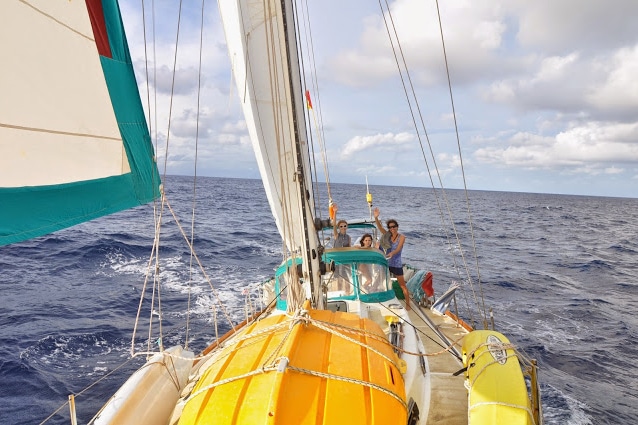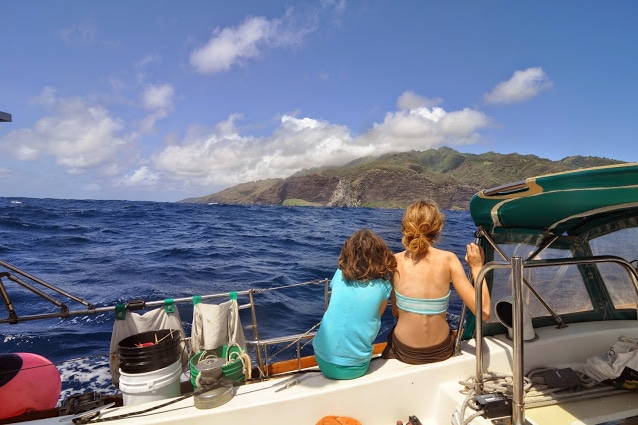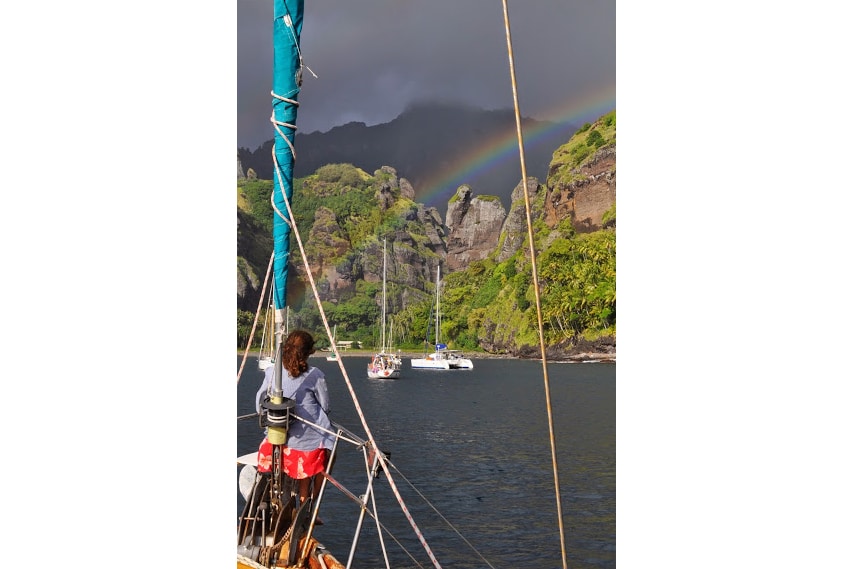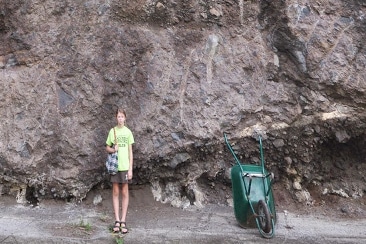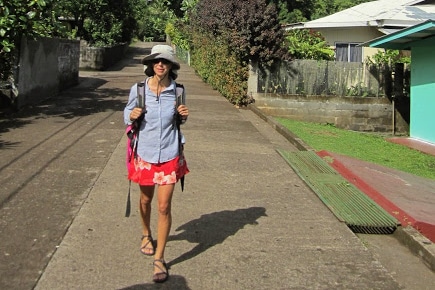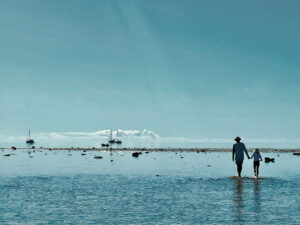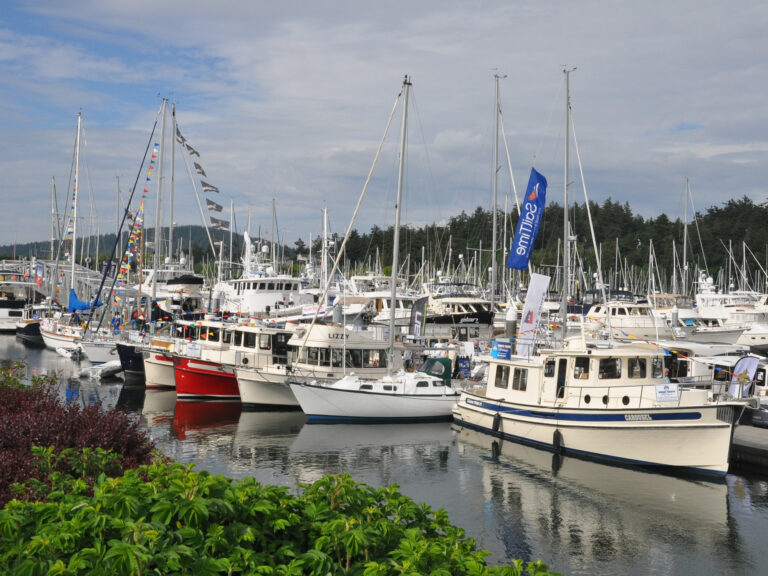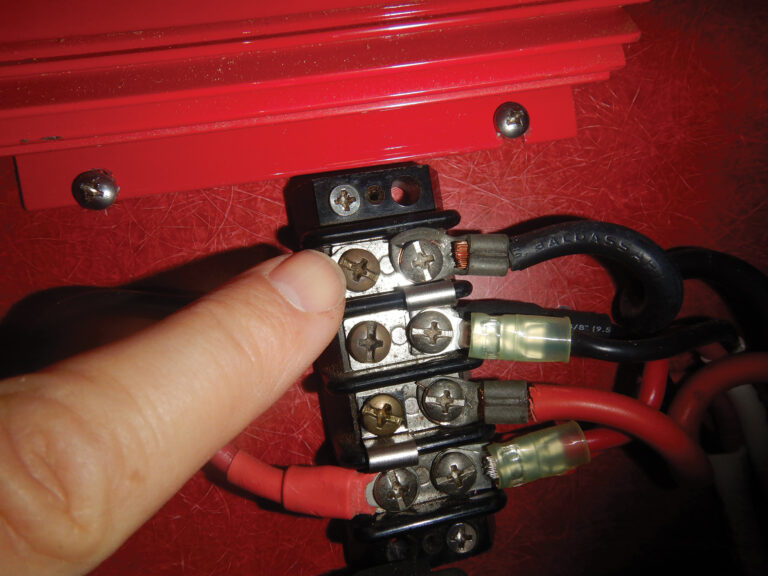There was no sign of the mentally challenged boy or the smiling stoned woman as we approached the quay in our dinghy, our second day in Hanavave. Walking up the now-familiar road we greeted people, wary of running into Pushy Man.
“Oooh Mom, loooook.” Frances was kneeling at the gate of a house I’d just walked by. Twenty feet inside the yard was a tiny cream-colored kitten. “Come here little guy, come here.”
A woman came out of the house and motioned us into her yard. Frances and Eleanor went right to the kitten. The woman asked if we wanted fruit, for échange.
“Exchange.” Windy said. “She wants to trade.”
“Oui!” we both said to the woman.
She turned away and seemed to be looking for something. Then she waved us back over to the gate we’d used to enter her yard. About a dozen schoolkids were walking up the narrow concrete street. She seemed to be barking orders at them, like urging them on. Then she pulled one boy inside the yard. He looked to be about Frances’s age, but about three times Frances’s size. The boy stood mute, staring at us while the woman pointed at his feet. He was wearing $2.00 flip-flops, she wanted to trade fruit for shoes.
Over the next ten minutes, we made it clear that Windy wouldn’t trade the shoes on her feet, that we probably do not have shoes to trade that fit the boy, and she made it clear that she had a variety of fruit to trade, and that she also wanted pens and pencils and rope—she really wanted rope, corde.
“Okay, we’ll be back in two hours.” I said, gesturing at the watch I wasn’t wearing and indicating two. “How do you say hours?” I asked Eleanor.
“Um, I don’t know.”
“Merci, au revoir!” we called out, leaving the yard with a plan.
We’d not checked out the south side of the village, so we crossed the river and headed that way, circling back to the dinghy.
“Bonjour!” a woman called out from her house as we passed.
We waved, “Bonjour!” and she motioned us to enter her yard.
“Miel?” she asked as we approached.
“That’s honey,” I said to Windy, “same as Spanish—but we don’t need any honey.”
“No.”
“But it would be cool to have some if it’s from here.”
“It lasts forever.”
I managed to ask where the hive was, the abeilles. She walked me around to the boxes behind her house, they buzzed. “Bonne, tre bonne.” I said.
She motioned us into her home; we all followed her lead and removed our shoes. From a large locker against a back wall, she pulled out a wine bottle, corked and filled with honey. I imagined this nectar imbued with the fragrance of all the flowers we’d been walking past. I imagined honey like no other.
“C’est combien?” I asked, looking up from the French-for-travelers book.
She replied and we all looked at Eleanor.
“Um, um, three thousand francs.”
“That’s like thirty bucks” I said to Windy. “Échange?” I asked the woman.
“Oui, oui.” She said and disappeared into an adjacent home, returning with a raincoat. We shook our heads, “No, no.”
“Corde?” she asked.
Eleanor and the rock wall that goes straight up from the quay. I paused and she pointed to a piece of rope in the yard.
“Oui, oui, corde.” Then she let us know she needed pens and colored pencils.
Back aboard Del Viento we went through the giant duffle bag filled with all kinds of things we’d been saving the past year for a day just like this. There were clothes and shoes Frances had outgrown that we’d kept rather than give away. There were markers and pens we’d stockpiled. There were puzzles we’ve solved, games we had duplicates of. There were nice bags we’d never need and handy knickknacks Windy had brought back from Thailand. There was rope, lots of rope.
We returned first to the home of Leah, the woman with the $30 honey.
We exchanged pleasantries and inside her home, I laid out the things we’d earmarked for her onto a table she’d cleared. She surveyed them quietly and then picked up the two lengths of old rope I’d deposited and left without a word to the adjacent house.
“I think her husband is in there.” Windy said.
Leah came back shaking her head, “No miel, all gone.” She explained somehow that a sick neighbor needed the honey so she didn’t have it to sell anymore. We suspect our offerings were insuficient. Without pausing, she covered half my loot with her hands, looked up at us and said, “Le citron,” and then covered the other half and said, “La banane.”
Windy and I looked at each other. I stepped forward and removed the new packs of markers and colored pencils and held them to me with one hand while waving the other over the piles as she had, “Le citron, la banane.”
She frowned and shook her head, muttering something that involved the poor babies who would be denied the markers and colored pencils. She took the packs of markers and pencils back from me, replaced them in the le citron pile, and removed a couple of t-shirts and handed those to me.
“Le citron, la banana.” She said again with the hand wave.
“Oui!” I spat out in spite of myself.
She ushered us all outside, grabbed a picker, and began plucking luscious limes and oranges from 10 and 12 feet up in the trees in her yard. Then she untied a giant stock of green bananas and handed it to me. Then she put together a bag of fat red bananas that we understood were for cooking.
“Merci, au revioir!”
Main St., Hanavave. That turquoise building is the store.
Out on the street Windy shook her head, “Why did you say yes, that was a lot of stuff for some fruit—and we’re supposed to get fruit from the next house.”
“Yeah, good point.” We were weighed down with fruit on our way to trade for fruit. We had no honey.
When we got to the next house, they’d prepared a large cardboard box of coconut, papaya, pamplemousse, and orange. Frances handed over the bag we’d prepared for the couple and I pulled out a 30-foot length of ½-inch line. He took the line, glanced in the bag, and nodded, motioning for us to take the box. Then he picked up the kitten and tried to give it to Frances.
“No, no, no, merci, no.” We laughed and shook our heads. His wife insisted we take the kitten. “Oh, no, no. Merci, merci beaucoup, au revior!”
To our surprise, the little store was open when we walked by. It carried almost the same inventory as a tienda in a small Baja community, like San Evaristo or Agua Verde. The difference was that it was as clean and orderly as a hospital. Like everyone else, we took off our shoes before entering. We looked around at labels, some familiar, most not. I held up a euro note to the cashier, “Tres bien?”
She shook her head, “No.”
I said, “U.S. dollar?”
“No, no dollar, no euro—franc.”
“Oui, merci.” I said to her, smiling. “We’re out of luck.” I said to Windy.
The little store was crowded and I stepped outside next to our shoes and the giant stalk of bananas and the bags and box of fruit we’d traded lots of stuff for. Inside, the cashier motioned Windy over and handed her a pile of French Polynesian francs. Windy shook her head and tried to insist that she not take the money, the woman was better at insisting. Windy and the girls each picked out a soda and approached the cashier with the gifted francs in hand. Then the cashier rang up the sodas, put them in a bag with a bunch of other goods she’d pulled from the shelves, and tried to give Windy change.
“No, no, merci, au revoir!”
“Mike, give me a nice length of rope.” She said outside. She went back in with the rope and then returned 30 seconds later with the rope. “She won’t take it.”
“What in the world…?”
“Yeah, in the bag are things I picked up and looked at and things she must have thought I was looking at. I’ll return with some kind of gift for her tomorrow.”
Aboard Del Viento we unloaded our booty and tied our banana stock beneath the bimini like real Pacific island cruisers.
In our twenties, we traded our boat for a house and our freedom for careers. In our thirties, we lived the American dream. In our forties, we woke and traded our house for a boat and our careers for freedom. And here we are. Click here to read more from the Log of Del Viento.
